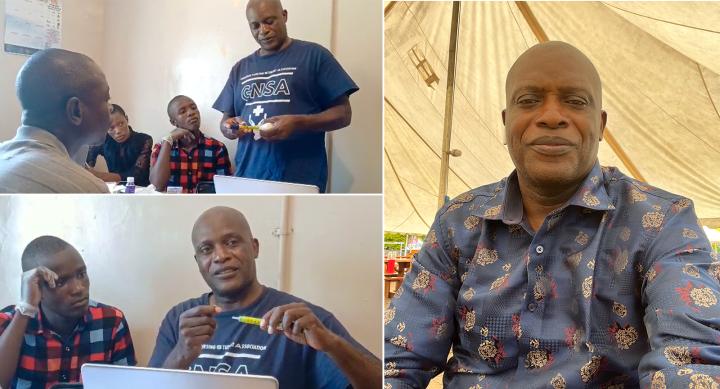
Bruce Machona, MSN, RN, a PhD student at The University of Texas at Austin School of Nursing graduating in Fall 2025, is driven by a personal and professional mission: to improve maternal health for women living with gestational diabetes, particularly in resource-limited settings, like his native country of Zimbabwe.
Born and raised in in the southern Africa country, Machona moved to the U.S. in 2001. He holds a bachelor’s degree in secondary education and a master’s degree in biotechnology.
His journey into maternal health research began after relocating to Canada in 2008, where he worked as a research assistant studying tuberculosis and taught junior and high school students in the North Territories.
During that time, Bruce was diagnosed with type 2 diabetes.
“For the longest time, I did not understand what was going on, and I really did not get education on how to manage it,” Machona said. “It was bad because I could not function at all, even driving a vehicle; sometimes I would sleep on the wheel. This diagnosis became a game-changer for me. I decided to commit whatever time is left on this earth researching and educating people about this chronic disease, which is silently killing many people far more than HIV now.”
Gestational Diabetes and Maternal Health
Machona’s doctoral research examines how women in Zimbabwe experience and navigate gestational diabetes mellitus (GDM) within a resource-limited health system. His interest in this area was sparked by a convergence of his maternity coursework, clinical experience, research training, and a strong commitment to maternal health equity.
He said during his maternity class, he learned that 50 to 70 percent of women diagnosed with GDM—depending on the source—go on to develop type 2 diabetes.
“I developed an ardent interest since I have witnessed firsthand how diabetes can disrupt life,” he added.
He observed how gestational diabetes can disrupt not only a pregnancy but also a woman’s sense of identity, particularly when care systems are fragmented or under-resourced.
“What truly moved me toward this project was the realization that postpartum care for GDM is often neglected, particularly in low-resource settings like Zimbabwe,” he said. “Some women are left without guidance, support or follow-up despite the long-term risks to both maternal and child health. I wanted to center their voices, understand their lived realities and build tools that could help reshape systems from the ground up.”
Insights from Zimbabwe
Machona’s research included interviews with both women who have a history of GDM and health care providers. He applied the Health Belief Model (HBM) to explore how women’s beliefs and perceptions shape their health behaviors. He connected personal experiences to broader systemic issues such as inconsistent screening, limited provider training and the lack of national postpartum guidelines.
Ultimately, his work aims to inform policy and practice by centering women’s voices and developing tools like the “Ubuntu Model,” a framework that emphasizes community, shared responsibility and culturally grounded approaches to improve maternal health services in resource-limited settings.
Machona said conducting research in Zimbabwe was a humbling and profoundly rewarding experience.
“On one hand, it was a privilege to engage directly with women whose stories are rarely heard in global health discourse. Their openness, resilience and honesty shaped every aspect of the study. I was welcomed into clinical spaces and communities that offered not just data but insight into how health, identity and survival intersect in powerful ways.”
At the same time, Machona said the experience required adaptability and cultural sensitivity. Managing ethical approvals and logistical challenges in a resource-limited setting demanded patience and close collaboration. He partnered with local health professionals and community leaders to ensure the research was respectful, meaningful and firmly grounded in the realities of the community.
Machona said his research underscores the vital role nurses play in identifying and addressing the emotional, educational and behavioral needs of women with GDM.
“Nurses are often the first point of contact in antenatal care, and my findings emphasize the need for culturally sensitive communication, consistent screening and postpartum follow-up areas where nursing leadership can drive meaningful change,” he added.
Bridging Care Gaps
From a global health perspective, Machona shared that his study sheds light on how chronic conditions like GDM are managed in resource-limited settings, revealing systemic gaps such as fragmented care pathways and food insecurity that impact maternal and child outcomes.
Ultimately, it advocates for integrated, lifecycle-based care models that enable nurses and health systems to provide equitable, sustainable maternal health services both locally and globally.
Machona plans to conduct longitudinal follow-up studies to explore neurodevelopmental outcomes in children born to mothers with GDM.
In addition, he plans to pursue postdoctoral training in biomarker discovery and neurodevelopmental epidemiology to integrate biological and qualitative insights and advocate for lifecycle-based care models that integrate maternal, neonatal and chronic disease services.
Reflecting on his experience, Machona noted how the research has shaped him both personally and professionally.
“As a nurse, it reminded me that clinical care is never just about protocols or lab value—it is about people navigating complex emotions, identities and systems,” he added. “Hearing women speak about their fears, frustrations and resilience challenged me to think more holistically about care, especially in postpartum and chronic disease contexts. It strengthened my commitment to culturally sensitive, equity-driven practice.
“As a researcher, it sharpened my ability to build structured, reproducible tools from deeply personal narratives,” he concluded. “It also reinforced the importance of reflexivity, acknowledging my own lens and positionality throughout the research process. Ultimately, this project taught me that rigorous research and compassionate care are not separate paths—they are deeply intertwined. And that the most impactful work often begins by asking: Whose voice is missing, and how can we make it heard?”